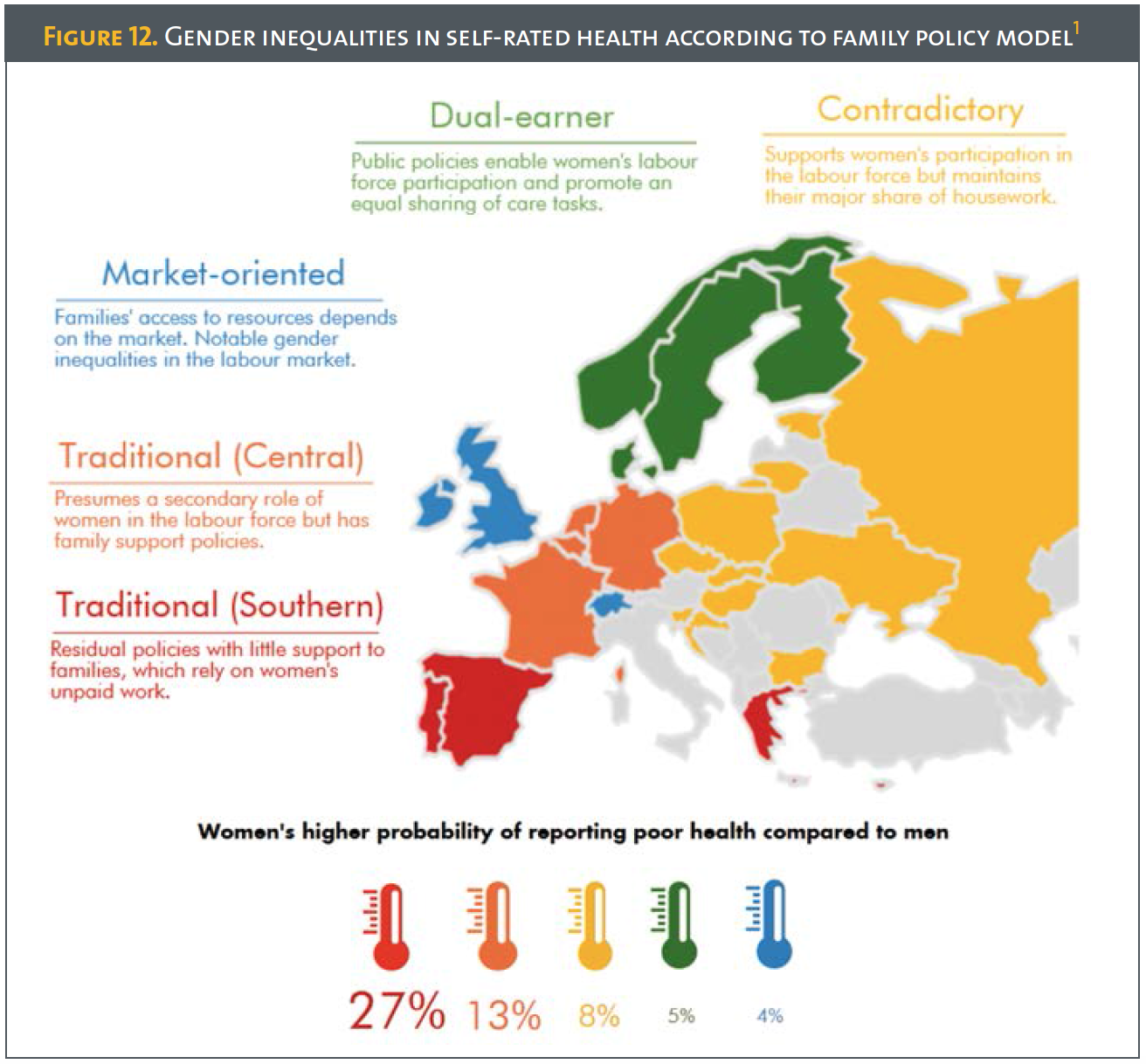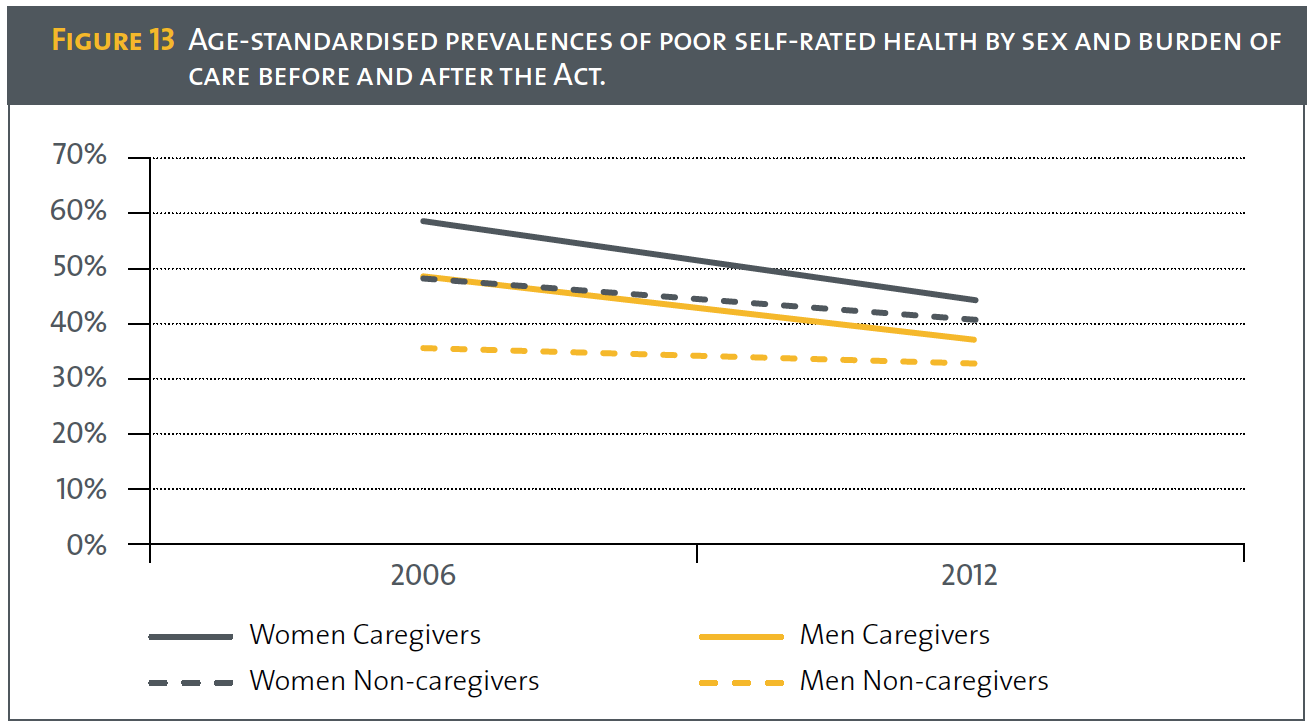Gender

Despite enjoying a longer life expectancy, women suffer more than men from a large host of non-fatal, disabling physical and mental illnesses and are generally expected to live fewer years in good health. Gender equality is increasingly on the agenda of the EU, and policies to advance towards equality are being implemented at all levels. Nevertheless, there is little evidence on how these policies are effective at reducing gender inequalities in health.
Main findings
Gender inequalities in health are larger in countries with policies less oriented towards gender equality
In traditional (Southern and Central) and contradictory countries women are more likely to report poorer health than men. This is particularly the case for Southern countries (2). Among wage earners, and across different social classes, gender inequalities in mental health are more widespread and pronounced in market-oriented countries than in countries with other economic systems (3). The burden of combining employment and family demands seems especially harmful for the self-rated and mental health of women in traditional countries and men in market oriented countries (4).
Lone mothers' health in Spain
Lone mothers are a vulnerable group at greater risk of poverty and unemployment even in rich countries. We analysed two Spanish National Health Surveys, 2003 and 2011, and found that lone mothers presented poorer self rated health, mental health and health-related behaviours than couple mothers. Manual class lone mothers were particularly disadvantaged. Inequalities between lone and couple mothers did not change along the period. In a country like Spain, where a traditional family model with insufficient family support policies for mothers exists, socio-economic assets are key to determining access to resources producing health inequalities. This could particularly affect Spanish lone mothers (5).
Parental leave and gendered time use in Sweden and Spain
Time allocation is a highly gendered process, and division of work is an important factor in gender equality. Studies have found that an unequal division of work is related to low levels of well-being, particularly among women. By using Multinational Time Use Study data from Sweden and Spain taken in 1990, 2000 and 2010, we observed that changes in leave policies involving the introduction of or increases in exclusive paternal leave were followed by reductions in time use inequality between mothers and fathers. Our conclusion is that family policies that support gender equality through earning replacement, parental leave for both parents with universal coverage, and working time flexibility to balance family demands contribute to equalising time use between genders (6).
(1). Borrell C, Palència L, Muntaner C, et al. Influence of macrosocial policies on women's health and gender inequalities in health. Epidemiol Rev. 2014; 36:31-48.
(2). Palència L, Malmusi D, De Moortel D, et al. The influence of gender equality policies on gender inequalities in health in Europe. Soc Sci Med. 2014; 117:25-33.
(3). De Moortel D, Palència L, Artazcoz L, et al. Neo-Marxian social class inequalities in the mental well-being of employed men and women: the role of European welfare regimes Soc Sci Med. 2015; 128:188-200.
(4). Artazcoz L, Cortès I, Puig-Barrachina V, et al. Combining employment and family in Europe: the role of family policies in health. Eur J Public Health. 2014; 24:649-55.
(5). Trujillo-Alemán S, Pérez G, Borrell C. Health inequalities between lone and couple mothers in Spain, 2003 and 2011. Forthcoming. PPT.
(6). Hagqvist E, Pérez G, Trujillo-Alemán S, et al. Are changes in family-friendly policies related to gendered divisions of time use? A study of Spain and Sweden, 1990-2010. Forthcoming. PPT.
Public services for disabled people can improve the health of family caregivers
How to resist austerity: the case of the Gender Budgeting strategy in Andalusia
As a political response to the current economic crisis, significant public policy budget cuts have been implemented while gender equality policies have been downgraded. An example of policy that has resisted austerity is the gender budgetary strategy in Andalusia. To understand why and how, we conducted a theory-driven explanatory case study. We interviewed politicians, feminist academics and civil society members. The main reasons for the resilience of the strategy include a strong political commitment with a solid female leadership supported by the continuity of a Social Democratic government, as well as several mechanisms triggered by the previous context of institutionalisation of the strategy and the facility provided by its low maintenance cost (9).
(7). Salvador-Piedrafita M, Malmusi D, Borrell C.Time trends in health inequalities due to care in the context of the Spanish Dependency Law. Gaceta Sanitaria, 2016
(8). Salvador-Piedrafita M, Malmusi D, Mehdipanah R, et al. Views of informal caregivers and healthcare professionals on the effects of the Dependence Act on caregivers' quality of life: concept mapping. Forthcoming. PPT.
(9). Puig-Barrachina V, Ruiz M, Malmusi D, et al. How to resist austerity: the case of the Gender Budgeting strategy in Andalusia. Forthcoming. PPT.
The intersectionality perspective is important in health equity research and policy evaluation
(10). Palència L, Malmusi D, Borrell C. Incorporating Intersectionality in Evaluation of Policy Impacts on Health Equity. A quick guide (report).
(11). Gotsens M, Malmusi D, Villarroel N, et al. Health inequality between immigrants and natives in Spain: the loss of the healthy immigrant effect in times of crisis. Eur J Public Health. 2015. doi:10.1093/eurpub/ckv126
(12). Mousaid S, De Moortel D, Malmusi D, et al. New perspectives on occupational health and safety in immigrant populations: studying the intersection between immigrant background and gender. Ethn Health. 2015. doi:10.1080/13557858.2015.1061103
(13). Dzúrová D, Drbohlav D. Gender inequalities in the health of immigrants and workplace discrimination in Czechia. Biomed Res Int. 2014:480425.
(14). Mousaid S, Bosmans K, Huegaerts K, et al. The Service Voucher System, health and health inequalities (report).
Policy implications
Policies that support women's participation in the labour force and decrease their burden of care, such as increasing public services and support for families and entitlements for fathers, are related to lower levels of gender inequality in terms of health.
Public services and benefits for disabled and dependent people can reduce the burden placed on their family caregivers and hence improve their health.
The intersectionality perspective should be taken into account as a health equity audit in the design and evaluation of policies and reinforced in research on health inequalities.
Research team
Gender studies in SOPHIE were part of Work Package 5 (Cross-cutting evaluation of policy impacts on gender and migration-related health inequalities), which has been led by Carme Borrell and Davide Malmusi, Agència de Salut Pública de Barcelona.
Other partners involved were Mittuniversitet, Vrije Universiteit Brussel and CRICH-SMH.




